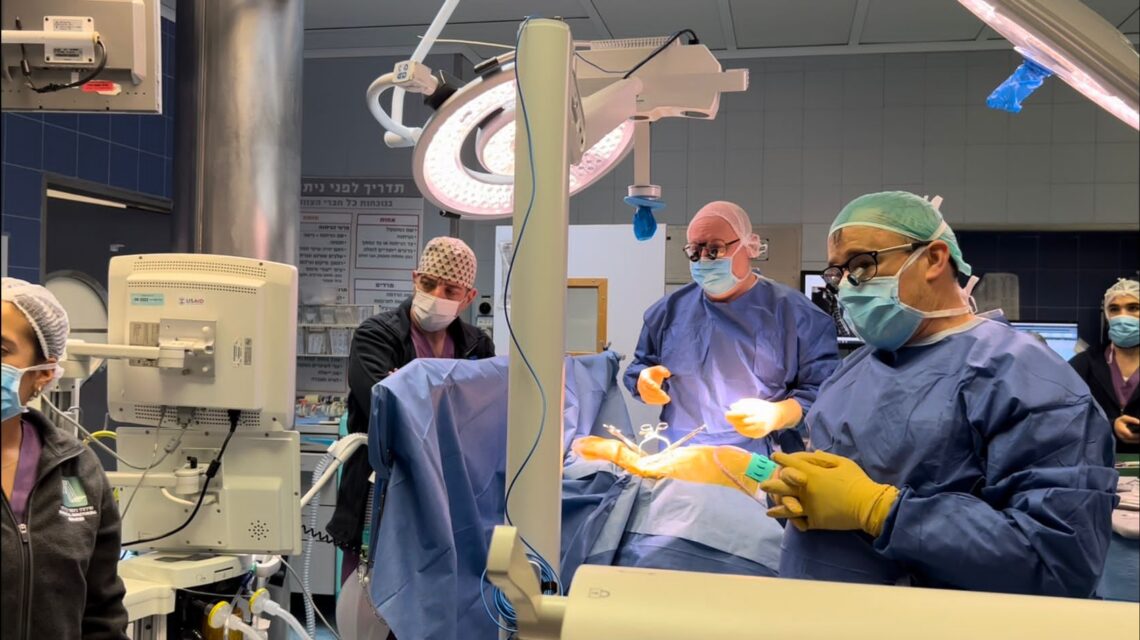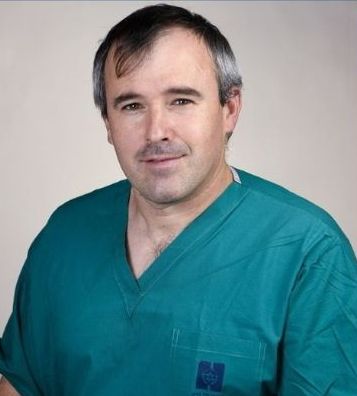
PathKeeper is a spinal surgery navigation system approved by the FDA. The system, developed in Israel by Professor Josh Schroeder, head of the Spinal Surgery Unit at Hadassah, and his partner Erez Lampert, enables surgeons to achieve maximum precision using a unique 3D camera mounted on a laser. This camera autonomously tracks all parts of the spine and vertebrae.
“The advanced system significantly minimizes risks in spinal surgeries and eliminates the need for radiation-based imaging during the procedure,” explains Professor Schroeder, who performed the surgery. “The tumor, which threatened to paralyze the teen, was successfully removed.”
A significant tumor was entirely removed from the back of a 16-year-old boy from Jerusalem, who had suffered from pain for an extended period, thanks to advanced technology introduced in Hadassah’s operating rooms.
The boy recently came to Hadassah Ein Kerem Hospital due to concerns about a cancerous tumor discovered in a CT scan. “For months, the teen suffered from lower back pain, though not severe enough to raise red flags,” recounts Prof. Schroeder. “The alertness of the pediatrician, who noticed that the pain persisted, led to a referral to an orthopedic specialist who suspected nerve compression and recommended a CT scan. The tests revealed a large, aggressive precancerous tumor, the size of a ping-pong ball, blocking the spinal canal and threatening paralysis.”
Prof. Schroeder emphasizes that such a condition typically necessitates complex surgery requiring extreme sensitivity and precision to avoid damage to the spine. “The only way to remove the tumor in these cases is through a long and complicated surgery,” he explains. “Spinal surgeries always carry a certain risk to the patient. Moreover, cancerous cells sometimes hide within the tumor, which cannot be detected beforehand.”
The main challenge for the surgical team was to maintain absolute precision during the operation to avoid damaging the teen’s spinal nerves. Therefore, the PathKeeper system was utilized, which allows complex surgeries with high accuracy and without radiation.
“The system is an optical navigation tool for spinal surgeries approved by the FDA (Federal Drug Administration) and the Israeli Ministry of Health and introduced into Hadassah’s operating rooms,” explains Prof. Schroeder. He and his partner, Erez Lampert, an expert in 3D medical imaging, developed the system with support from “Hadasit,” Hadassah Medical Center’s innovation and commercialization company. Since 2019, Hadasit has assisted PathKeeper during its early stages, and the system was included in the first cohort of the Hadassah Accelerator, operated by IBM Alpha Zone.
The advanced system minimizes risks in spinal surgeries. It allows surgeons to see the surgical tools’ precise location relative to the spine and nerves in real-time, preventing the need for radiation-based imaging.
The system uses a unique 3D camera mounted on a laser and independently monitors all parts of the back and vertebrae of the spine. Images are processed and integrated with preoperative CT scans for maximum precision,” Prof. Schroeder wishes to emphasize.
Hadassah’s Orthopedic Division, and especially the Spine Surgery Unit, invests in technological advancements to ease patients’ experiences and reduce surgery risks. The unit employs 3D imaging (OARM and ZIM), robotics, and optical navigation systems for all surgeries performed at the hospital. Prof. Schroeder, Prof. Kaplan, Dr. Einav, Dr. Sagiv, Shaon, and Dr. Asa conduct dozens of surgeries weekly using these technologies.
“After four hours of surgery, assisted by anesthesiologist Dr. Dmitry Klauzani, we successfully removed the tumor in its entirety,” concludes Prof. Schroeder. “The use of such advanced technologies at Hadassah allowed us to safely perform a surgery that could have been far more complex. These innovative systems are not just a ‘status symbol’ – they enable us to provide tailored, precise care and achieve the best patient outcomes.”
According to head nurse Sahar Qusseini, the boy recovered successfully and showed significant improvement in the recovery ward. He was discharged just a few days later, feeling relaxed and progressing well. His father expressed relief, describing the family’s ordeal that ended in the best possible way: “Our experience at Hadassah was excellent and humane. The staff treated us professionally and caringly, and my son is recovering well.”
“Thanks to this innovative technology, his recovery was quick, allowing him to return home just in time for his brother’s Bar Mitzvah celebration shortly after,” concludes Prof. Schroeder.

